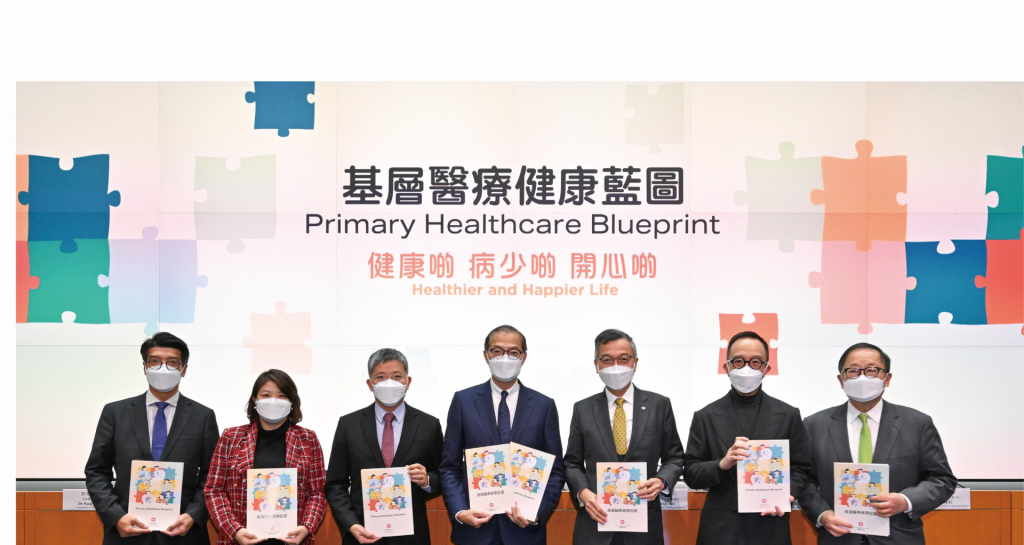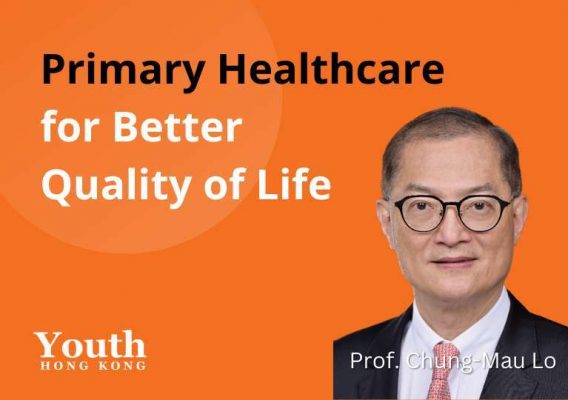//vol.15-1 Interview
Prof. Chung-Mau Lo
- The Government has an integrated and multidisciplinary approach towards health promotion and preventive measures to tackle an aging population and the rise of chronic illnesses.
- The Primarv Healthcare Blueprint on December 2022 outlines a strategic roadmap for the future development of primary healthcare in Hong Kong.
- There are five maior components in the Blueprint as part of the primary healthcare reform.
- The Government urges all young people to start managing their health earlier so as to build a healthier Hong Kong.
- 為應對香港人口老化和慢性疾病的增加,政府採用了綜合和跨學科的方法來促進健康和採取預防措施。
- 2022 年12 月發表的基層醫療健康藍圖,為香港末來基層醫療發展制定了策略路線圖。
- 作為基層醫療改革的一部分,本藍圖包括五個主要部分。
- 政府希望青年能提早開始管理自己的健康,以建立一個更健康的香港。
How would you describe the state of both physical and mental health in Hong Kong today, most especially post Covid-19?
Hong Kong has the longest life expectancy in the world which can partly be attributed to an effective and efficient public and private healthcare system of very high professional standards. Nonetheless, facing major challenges brought about by a rapidly ageing population and the increasing prevalence of chronic diseases, the overloaded situation of the public healthcare services, with long waiting times, will only be further aggravated if there is no fundamental reform.
Over the past three years, the COVID-19 pandemic has further demonstrated the critical importance of a strong primary healthcare infrastructure and workforce within the community. At the same time, it has also exposed and exacerbated the financial burden on our healthcare system and the social costs of chronic diseases. A robust primary healthcare system will be an important line of defence against a wide range of potential public health crises.
A robust primary healthcare system will be an important line of defence against a wide range of potential public health crises.
Meanwhile, the Government attaches great importance to the mental health of the public under the epidemic, and understands that the COVID-19 epidemic has posed considerable challenges not only on the physical but mental well-being of the public.
Hence, the Government has adopted an integrated and multi-disciplinary approach towards mental health, including promotion, prevention, and early identification, as well as timely intervention and treatment, and rehabilitation for persons in need. We have introduced initiatives that address the mental health needs that have arisen under the COVID-19 epidemic. For instance, we earmarked $300 million under the Beat Drugs Fund and launched the “Mental Health Initiatives Funding Scheme” in 2021 so as to provide better support to the needy in the community and to raise public awareness of mental health amidst the epidemic.
What would you say are the challenges that Hong Kong faces in terms of health?
With its longevity, Hong Kong has one of the most rapidly ageing populations in the world and the speed of ageing will peak in the upcoming decade. Ageing is also associated with increasing health and social care needs and a higher prevalence of chronic diseases. The number of Hospital Authority (HA) patients with chronic diseases is projected to reach three million by 2039. More alarmingly, a substantial number of patients with chronic diseases – believed to be as many as a double the diagnosed number – remain undiagnosed and unmanaged. Diabetes Mellitus (DM) and Hypertension (HT) are most prevalent diseases especially among the aged.
The ageing population and the increasing prevalence of chronic diseases will exert a heavy toll on secondary/tertiary care, especially in public hospitals [and] the utilisation rate of hospital services will rise exponentially for people aged 65 and over. Despite only making up 18% of the population, they already accounted for around half of all in-patient days and accident and emergency admissions, as well as over one-third of General Out-patient Clinic (GOPC) and Specialist Out-patient Clinic (SOPC) attendances in 2019. Among GOPC, Family Medicine Specialist Clinic and SOPC patients, around 60% had selected chronic diseases, of which 82% hade DM/HT. Among DM/HT patients, one in three had developed complications when just diagnosed, and their per capita service cost was two times higher than those without complications.
In the face of the pressure brought on by an ageing population and the increasing prevalence of chronic diseases, it is not possible to cope with the ever-rising healthcare demand solely through increasing public healthcare expenditure in public hospital services. Hence, we see the need to introduce a systemic reform of the healthcare system to shift the focus from treatment to disease prevention, to ensure healthy longevity for our people.
We see the need to introduce a systemic reform of the healthcare system to shift the focus from treatment to disease prevention.
Can you explain this further; why the new approach and the purpose behind it?
To achieve a healthy longevity, we need to shift the centre of gravity of our healthcare system from treatment-oriented-institution-centric-secondary/tertiary healthcare to prevention-oriented family-centric primary healthcare.
Under the guidance of the Steering Committee on Primary Healthcare Development (SCPHD), the Government launched the Primary Healthcare Blueprint (The Blueprint) on 19 December 2022 which sets out our vision, concrete recommendations and implementation plans, and outlines a strategic roadmap for the future development of primary healthcare in Hong Kong. The Blueprint puts forward five major directions of primary healthcare reform, including –
- Developing a community-based primary healthcare system;
- Strengthening primary healthcare governance;
- Consolidating primary healthcare resources;
- Reinforcing primary healthcare manpower; and
- Improving data connectivity and health surveillance.
Our vision is to improve the overall health status of the population, to provide accessible and coherent healthcare services, and to establish a sustainable healthcare system.
Could you share more about the Public Private Partnership (PPP) programmes mentioned in the recent Blueprint?
The current public healthcare system serves as an essential safety net for the population, especially those who lack the means to pay for their own healthcare. To optimise the utilisation of private healthcare resources and leverage on the private sector’s capacity for providing primary healthcare services, the Government has launched various government-subsidised or public-private partnership programmes in recent years with a view to tapping into private healthcare resources in meeting the demand for public primary healthcare service.
As announced in the 2022 Policy Address and recommended in the Blueprint, the Government would introduce a three-year “Chronic Disease Co-Care Pilot Scheme” (CDCC Scheme) in the third quarter of 2023 with a view to enhancing public awareness of chronic disease prevention and management. The scheme aims to identify citizens with a high risk of HT and DM through screening coordinated at District Health Centres, and to conduct health planning for targeted citizens in collaboration with community networks and private service providers. The Government will subsidise about half of the examination and treatment fees. This will incentivise citizens with higher affordability to use private healthcare services for early detection and management of chronic diseases.
With the introduction of the CDCC Scheme, we see the need to reposition GOPCs progressively to enable a targeted use of public resources. As a safety net for the population, GOPC service should take priority care of the socially disadvantaged population groups (especially low-income families and the elderly poor).
Could you tell us more about the HA GO system and online consultations, particularly in reachability and usage?
HA Go is a very convenient and easy-to-use app that any citizen can install to use HA’s services. In particular, during the 5th wave of COVID, patients with infections could easily book and attend online consultations using HA Go on their smartphones without the trouble of actually going to a clinic. At the end of January 2023, nearly 200,000 online consultations had been conducted on the HA Go app by COVID Designated Clinics. With HA Go, online consultations are also being provided in phases by other Specialist Outpatient Clinics for suitable patients. HA Go will soon provide electronic sick leave and attendance certificates, and will also provide drug delivery services. This will greatly improve patients’ experience, especially for the elderly and those living in rural areas.
The Government will continue to utilise information technology, digital technology and artificial intelligence infrastructures, with a view to providing members of the public with 「Smart Healthcare」 and enhancing operational efficiency. The Blueprint also proposes to transform eHealth from a basic health record sharing system into a comprehensive and integrated underpinning information infrastructure for healthcare data sharing, service delivery and process management. In primary healthcare-related services, it will facilitate service record keeping, essential data sharing (such as allergy histories, diagnoses, prescriptions, etc.), health monitoring and surveillance, case and workflow management (including triage, referrals and payments), and will explore the use of big data analytics to contribute to population health surveillance and individual health management.
Is there is anything else you’d like to share?
Since the Government launched the Primary Healthcare Blueprint in December 2022, I am very delighted that we have received overwhelming response and support from the community and the healthcare professionals. Primary healthcare is the first level of care in the healthcare system and is the first point of contact in a continuing healthcare process. The key concept of “prevention is better than cure” in primary healthcare should be imprinted early in the mind of our young people who should start managing maintenance of their health early rather than seeking treatment for their illnesses later in life. I encourage all young people to start health management with your friends and family today and to visit the DHC next to your residence or working place. With your support, let us join hand in hand to make sure that we can build a healthier Hong Kong.



